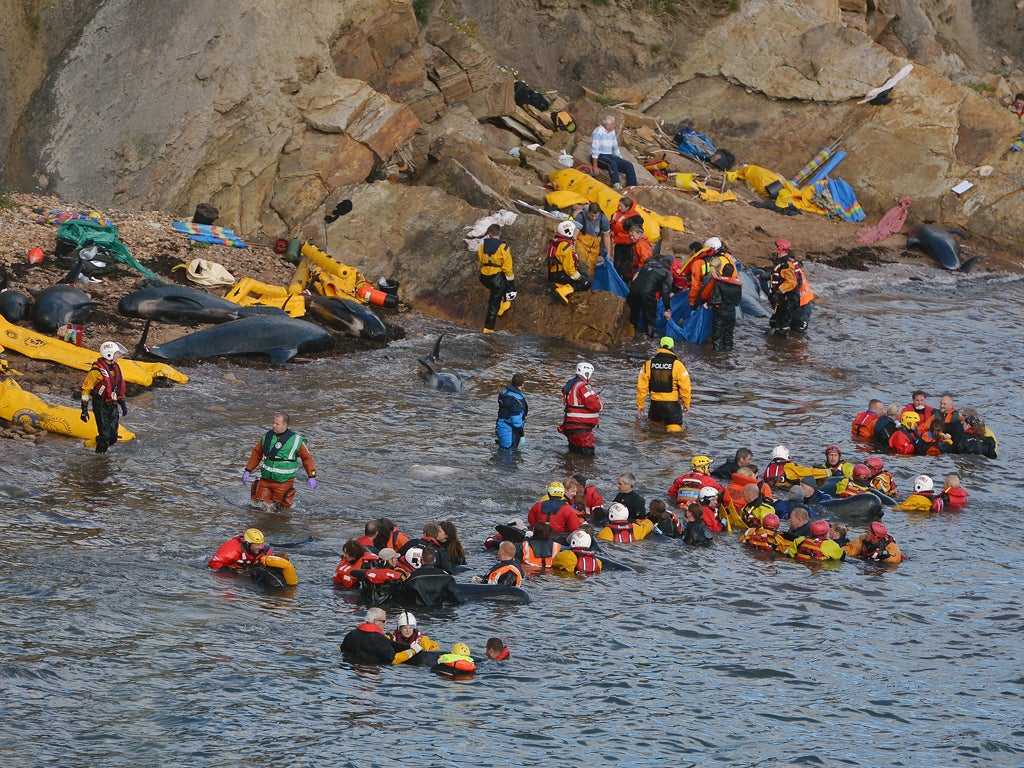Another whale dies after Fife mass stranding that left 16 dead

Your support helps us to tell the story
From reproductive rights to climate change to Big Tech, The Independent is on the ground when the story is developing. Whether it's investigating the financials of Elon Musk's pro-Trump PAC or producing our latest documentary, 'The A Word', which shines a light on the American women fighting for reproductive rights, we know how important it is to parse out the facts from the messaging.
At such a critical moment in US history, we need reporters on the ground. Your donation allows us to keep sending journalists to speak to both sides of the story.
The Independent is trusted by Americans across the entire political spectrum. And unlike many other quality news outlets, we choose not to lock Americans out of our reporting and analysis with paywalls. We believe quality journalism should be available to everyone, paid for by those who can afford it.
Your support makes all the difference.A whale thought to have been one of the 10 rescued from a mass stranding on a beach has died further down the coast.
The mammal died after becoming stranded just outside the Port of Leith, near Edinburgh.
Details of the latest death come as post-mortem examinations try to determine what caused 26 whales to be stranded at Pittenweem in Fife yesterday morning, resulting in the deaths of 16 of them at the time.
Work is also under way to remove the carcasses of those that died from the Fife coastline.
Forth Coastguard was alerted to the mass stranding at the base of steep cliffs at around 7am yesterday.
When British Divers Marine Life Rescue (BDMLR) got to the scene, 13 of the 26 whales were dead.
A major rescue was launched with around 50 people from BDMLR, the coastguard, fire service, police and SSPCA trying to save the animals.
The whales were kept cool and hydrated with wet blankets and sheets on the shore but a further three whales died naturally during the operation. The remaining 10 were refloated by BDMLR volunteers and left the harbour that evening.
The whales appeared to help one member of the group regain its balance as it readjusted to being back in the water.
Experts hoped the group would turn north and return to deeper water but the last reported sighting was of a pod of around 10 pilot whales in the area close to shore near Leith.
BDMLR operations manager Stephen Marsh said: "It is likely that this is the pod of rescued whales from Sunday's mass stranding at Pittenweem. If this is the case then the animals headed south-west yesterday rather than moving out into the North Sea and heading north as hoped.
"One of these later stranded just outside the port and has died naturally. The rest of the pod has now turned away and is out of sight, so it is hoped again that they will head out to deep sea and north.
"As part of the Cetacean Strandings Investigation Programme, veterinary pathologists from the Scottish Agricultural College and Zoological Society of London are currently carrying out post-mortems on the animals that died."
It is not known in which direction the pod is now travelling but he said he hopes they are sighted further north.
BDMLR has people on watch around the east coast of Scotland and other marine charities and organisations have been asked to keep an eye out for the animals.
"BDMLR is hoping that any sightings will be directly reported to them so that they can monitor the whales," Mr Marsh said.
They welcome information from members of the public about definite sightings of pods of whales on the east coast of Scotland.
It is not clear what caused the whales to end up on the Fife beach. A further 24 pilot whales from the same pod were also spotted in shallow water three miles along the coast at Cellardyke yesterday.
It is hoped the post-mortem examinations will offer some clues about what happened, although it could take several days for the test results.
Meanwhile, Fife Council said it is organising the clean-up of the coastline near Pittenweem.
Bob McLellan, head of environmental services, said: "This is an incredibly awkward site as we have no direct road access and the whales are lying at the bottom of a cliff. However, to move them out to sea would be problematic due to the tides.
"Arrangements are now in place to winch the whales up the cliff face into specially lined skips. A specialist contractor will then deal with the disposal of the mammals.
"We're working with the Scottish Environment Protection Agency, the State Veterinary Service, the Coastguard and contractors to get the situation dealt with as efficiently and effectively as possible."
Long-finned pilot whales have strong family bonds, meaning that the species is prone to mass strandings because the whole pod may follow one animal that is ill or confused into shallow water.
The last mass stranding of pilot whales in Scotland was in the Kyle of Durness in July last year, where BDMLR returned 44 whales to the sea.
Join our commenting forum
Join thought-provoking conversations, follow other Independent readers and see their replies
Comments